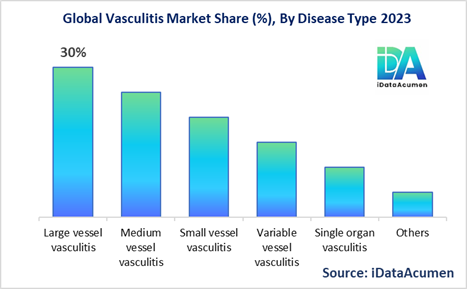The Global Vasculitis Market size is anticipated to reach USD 7.3 billion by 2031, expanding at a CAGR of 6.3% over the forecast period of 2024 to 2031. Vasculitis refers to inflammation of the blood vessels caused by autoimmune dysfunction leading to restricted blood flow and potential organ damage.
The rising prevalence of autoimmune disorders such as rheumatoid arthritis is a key factor driving the vasculitis market. According to estimates, the annual incidence of vasculitis is around 20 cases per 1 million people worldwide. Advancements in diagnostics such as imaging, biopsy tests, and ANCA assays also support market growth.
The development and regulatory approval of targeted biologic therapies by leading pharma companies has opened new avenues for market expansion. The entry of novel monoclonal antibodies, recombinant proteins, and fusion proteins provides effective alternatives to traditional immunosuppressants for vasculitis management. Strategic collaborations focused on biomarker research further aid therapy development.
However, misdiagnosis risk due to overlapping symptoms and high costs of biologics restrain adoption in developing regions. Nevertheless, opportunities exist in the form of precision medicine approaches, gene therapies, and launch in emerging markets. Analysts have observed increased mergers and acquisitions in this niche market recently.
Vasculitis refers to a group of rare diseases that cause inflammation of the blood vessels. It occurs when the immune system attacks healthy blood vessels, causing them to become inflamed. This can restrict blood flow and damage the tissues and organs supplied by these blood vessels. There are many types of vasculitis that can affect different sizes of blood vessels in various parts of the body. Some common symptoms include fever, fatigue, weight loss, aches, rash, numbness, and organ damage. Treatment typically involves medications to reduce inflammation and suppress the overactive immune system.
Key Report Insights:
- Major market driver: Rising prevalence of autoimmune diseases and increasing awareness about rare diseases is expected to drive growth (Incidence of vasculitis around 40-50 per million population)
- Companies are conducting research to develop targeted therapies. Biopharmas like ChemoCentryx, Kiniksa Pharmaceuticals have pipeline drugs for vasculitis treatment.
- Diagnostics like ANCA testing, biopsy, and imaging tests are critical for vasculitis diagnosis and assessment of organ involvement.
- Shift towards biologics and targeted therapies that can selectively suppress inflammation is an emerging trend.

Key Drivers and Trends:
Increasing R&D Focus on Targeted Therapies
The shift from broad immunosuppressants to targeted biologics that can selectively modulate inflammatory pathways implicated in vasculitis pathogenesis is a key trend.
Strategic Industry Collaborations on the Rise
Partnerships between global biopharmas and smaller biotechs focused on sharing patient data and resources are rising. This helps accelerate research and drug development.
Regional Segmentation:
North America Captures Lion's Share of 45% Market Revenue
North America dominated the global vasculitis treatment market in 2022, accounting for a 45% revenue share. Presence of several pharma bigwigs coupled with higher disease prevalence and diagnosis rates contribute to the large share. Amgen, Pfizer, Abbvie, and GSK are top players in the region.
Asia Pacific Set for Rapid Growth Due to Large Underdiagnosed Patient Pool
Asia Pacific is anticipated to witness exponential growth during 2023-2030. Expanding population, improving healthcare infrastructure and insurance coverage will help tap into the massive underdiagnosed patient pool. Localization efforts by companies also boost access to costly biologics.
Notable Companies in Global Vasculitis Market
Amgen, Abbvie, Pfizer, GlaxoSmithKline, Genentech, AstraZeneca, Merck, Johnson & Johnson, Takeda Pharmaceuticals, Novartis, Eli Lilly, Bristol Myers Squibb, F. Hoffmann-La Roche, Teijin Pharma, Boehringer Ingelheim, Momenta Pharmaceuticals, Kiniska Pharmaceuticals, Emergent BioSolutions, EMD Serono, Otsuka Pharmaceutical, and ChemoCentryx.
Market Segmentation:
- By Disease Type
- Large vessel vasculitis
- Medium vessel vasculitis
- Small vessel vasculitis
- Variable vessel vasculitis
- Single organ vasculitis
- Others
- By Drug Class
- Corticosteroids
- Immunosuppressants
- NSAIDs
- Biologics
- Interleukin inhibitors
- Integrin inhibitors
- Others
- By Route of Administration
- Oral
- Injectable
- Intravenous
- Topical
- Inhalation
- Others
- By Distribution Channel
- Hospital pharmacies
- Retail pharmacies
- Online pharmacies
- Clinics & infusion centers
- Others
- By Region
- North America
- Europe
- Asia Pacific
- Latin America
- Middle East & Africa
Definition:
"Vasculitis refers to a group of rare disorders characterized by inflammation of blood vessels caused due to autoimmune dysfunction. It can result in restricted blood flow, leading to organ and tissue damage. There are many types of vasculitis that affect vessels of varying sizes across the body. Treatment involves immunosuppressive medications to control inflammation. The vasculitis market comprises drug manufacturers, research institutes, medical device makers engaged in the development of therapies, devices and diagnostics for vasculitis."